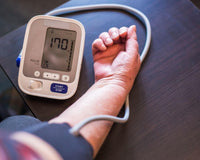Atorvastatin is a prescription-based medication that’s used to treat high cholesterol and lower the risk of heart attack, stroke, and other heart complications. It belongs to the group of medicines called HMG-CoA reductase inhibitors or statins. In this article we discuss the uses, side effects, safety, and dosage of Atorvastatin.
What is Atorvastatin?
Atorvastatin is a cholesterol-lowering prescription drug. Its brand-name is called Lipitor, but it’s also available in a generic form which typically costs significantly less money. The primary use of atorvastatin is to prevent certain types of heart and blood vessel problems in individuals with risk factors for heart disease.
Atorvastatin Uses
Atorvastatin is used to improve cholesterol levels in people with different types of cholesterol problems. It may decrease your risk for heart attack and stroke and is used in conjunction with a healthy diet, weight loss, and exercise.

How Does Atorvastatin Work?
Atorvastatin lowers your low-density lipoprotein (LDL) or “bad” cholesterol and raises your high-density lipoprotein (HDL) “good” cholesterol. It improves your body’s ability to dispose of LDL cholesterol through your liver.
What Are The Side Effects of Atorvastatin?
There are quite a few possible side effects of atorvastatin. This includes:
• Diarrhea
• Gas
• Heartburn
• Joint pain
• Confusion/forgetfulness
• Urinary tract infection (UTI)
Fortunately, these side effects are rather mild and can go away within a couple
Possible Serious Side Effects
If you are experiencing serious side effects call your doctor or 911 right away. Possible serious side effects of atorvastatin can include the following:
Liver Problems:
• Tiredness or weakness
• Loss of appetite
• Upper stomach pain
• Dark urine
• Yellowing of your skin
Muscle Problems
• Unexplained muscle weakness or pain
• Tiredness
• Tenderness
Disclaimer: At Manifest Pharmacy we want to provide you with the most relevant and up-to-date information available. Unfortunately, because drugs affect each individual differently, we cannot guarantee that we have included all possible side effects.
Does It Interact With Other Medications?
Atorvastatin may interact with other medications, herbs, and sometimes vitamins. Be sure to tell your doctor or pharmacist about all the medications you are currently taking. Drugs that may interact with atorvastatin are listed below.
Antibiotics
Atorvastatin may interact with other medications, herbs, and sometimes vitamins. Be sure to tell your doctor or pharmacist about all the medications you are currently taking. Drugs that may interact with atorvastatin are listed below.
Other Cholesterol-Lowering Drugs
Taking other cholesterol-lowering drugs while prescribed atorvastatin can increase your risk of developing muscle problems. Examples of these drugs include:
• Gemfibrozil
• Niacin • Medications that contain fibrate
Fungal Drugs
Drugs used to treat fungal infections may cause atorvastatin to build up in your body. This increases your risk for muscle breakdown. Some of these drugs include:
• Ketoconazole
• Itraconazole
How To Take Atorvastatin
The dosage information included below is for atorvastatin oral tablets. Not all possible dosage amounts are included here. Your dosage may depend on a few different things, such as:
• Your age
• The condition being treated
• The severity of your condition
• Other medical conditions you have • How you react to the first dose
Atorvastatin Dosage
Ages 18-64 (Adult Dosage)
• Starting dosage: 10-20 mg taken once daily
• Maintenance dosage: 10-80 mg taken once daily
Ages 0-17 (Children Dosage)
Atorvastatin is not approved for use in children under 18 years of age.
Ages 65 Years and Older (Senior Dosage)
The kidneys in older adults may not function as efficiently as they used to. This can cause your body to process drugs more slowly and as a result, drugs may stay in your system for longer. Consequently, this can increase your risk of experiencing side effects.
Take As Directed
Atorvastatin can come with risks if you don’t take it as prescribed.
If you miss a dose or don’t take the drug on a schedule: Your medication may not work as well or may stop working completely. In order for this drug to work well, a certain amount needs to be present in your body at all times.
If you stop taking the drug: Yes, eating a healthy diet can improve your cholesterol levels, atorvastatin may improve them even more.
How to tell if atorvastatin is working: Physically you will not be able to feel it working for you. Your doctor can measure your cholesterol levels and adjust your cholesterol levels accordingly.
If you take too much: You could have dangerous levels of the drug in your body if you experience the following symptoms:
• Diarrhea
• Excessive gas
• Heart burn
• Joint pain
• Confusion
• Forgetfulness
• Loss of appetite and stomach pain
• Dark-colored urine
Allergy Warnings of Atorvastatin
This drug can cause severe allergic reactions. This includes:
• Difficulty breathing
• Trouble swallowing
• Swelling of your face, tongue, lips or throat
Call 911 or go to the nearest emergency room if you are experiencing any of these symptoms. Don’t take this drug again if you’ve ever had an allergic reaction to it. Taking it again could be fatal (and even cause death).
Possible Food Warnings
Do not drink excessive amounts of grapefruit juice while taking atorvastatin. If you do it can cause a buildup of atorvastatin in your blood.
Alcohol
Alcohol increases your risk of liver disease. Speak with your healthcare professional if you drink more than two alcoholic drinks each day.
Who Shouldn’t Take Atorvastatin?
Kidney problems: If you have kidney problems that can increase your risk of muscle breakdown while taking atorvastatin.
Liver disease: It is highly recommended that you don’t take atorvastatin if you have liver disease because it may increase your liver test results. If you have liver problems talk to your healthcare professional before using.
Diabetes: Atorvastatin may elevate your blood sugar levels. You may need to monitor you blood sugar levels more closely if you’re taking this drug.
Other Warnings
Pregnant women: Those who are pregnant or planning to become pregnant should not use this drug. There is little-to-no safety research in pregnant women for atorvastatin.
Children: Atorvastatin should not be used by children younger than 10-years of age.
Breastfeeding mothers: If you are breastfeeding your child, it is best to talk to your health practitioner to find what medication is right for you.
What To Consider When Taking Atorvastatin
There are a few things to consider if you are prescribed atorvastatin oral tablets.
General
Don’t crush or chew the tablet under any condition.
Storage
Do not store atorvastatin in moist or damp areas. It is best to store this medication between 68°F and 77°.
Refills
This medication can be refilled. Your healthcare professional will write the number of refills on your prescription.
Travel
When you are traveling with atorvastatin:
• Carry it with you. Do not put it in a checked bag.
• X-ray machine cannot hurt your medication
• Do not leave this medication in the car if the weather is really hot or really cold.
• You may need to show airport staff the label for your prescription if you are traveling out of the country.
Your Diet
While taking this drug your doctor or healthcare professional may recommend that you follow a low-fat, cholesterol diet.
Atorvastatin: (Lipitor) Uses, About, Side Effects & Dosage
Atorvastatin is a prescription-based medication that’s used to treat high cholesterol and lower the risk of heart attack, stroke, or other heart complications. It belongs to the group of medicines called HMG-CoA reductase inhibitors or statins.
Atorvastatin lowers your low-density lipoprotein (LDL) or “bad” cholesterol and raises your high-density lipoprotein (HDL) “good” cholesterol. It improves your body’s ability to dispose of LDL cholesterol through your liver.








